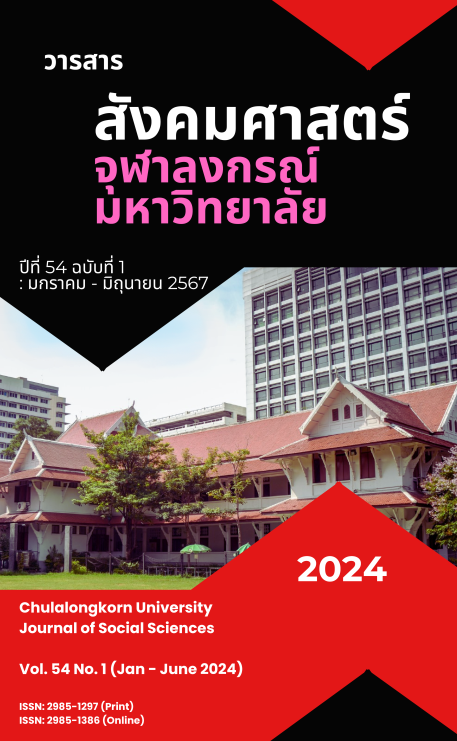การปรับตัวและการต่อรองของชุมชนชาติพันธุ์ต่อนโยบายการจัดการทรัพยากรธรรมชาติโดยรัฐ: กรณีศึกษาชุมชนบ้านกลาง และชุมชนบ้านฮ่าง จังหวัดลำปาง
DOI:
https://doi.org/10.61462/cujss.v54i1.2634คำสำคัญ:
อัตลักษณ์ทางกลุ่มชาติพันธุ์ , ไร่หมุนเวียน , เกษตรกรรมผสมผสาน , การอนุรักษ์ , การต่อรองบทคัดย่อ
จากการศึกษา พบว่า นโยบายการจัดการทรัพยากรธรรมชาติของรัฐ เช่น นโยบายทวงคืนผืนป่า การจัดที่ดินทำกินให้ชุมชนตามนโยบายรัฐบาล (คทช.) มาตรการการใช้ที่ดินในเขตลุ่มน้ำ เป็นปัจจัยสำคัญที่ทำให้ชุมชนบ้านกลางและชุมชนบ้านแม่ฮ่างได้รับผลกระทบทำให้เกิดการสูญเสียที่ดินทำกิน การสูญเสียวิถีไร่หมุนเวียนที่มาแต่เดิม และมีการห้ามใช้ประโยชน์จากป่า ซึ่งผลกระทบที่ชุมชนได้รับนำมาสู่การปรับตัวและการต่อรอง ผลการวิจัยพบว่า การปรับตัวของชุมชนบ้านกลางและชุมชนบ้านแม่ฮ่างมีทั้งที่เป็นไปในลักษณะคล้ายคลึงกันและแตกต่างกัน การปรับตัวที่คล้ายคลึงกัน คือ การลดจำนวนปีของไร่หมุนเวียน และการลดขนาดพื้นที่แปลง หรือเลิกการทำไร่หมุนเวียน แต่ความแตกต่างคือชุมชนบ้านกลางยังคงยืนหยัดทำไร่หมุนเวียนอยู่แม้จะต้องปรับรูปแบบและรอบเวลา ในขณะที่ชุมชนบ้านแม่ฮ่างหันมาปลูกพืชเกษตรกรรมผสมผสานและนำการท่องเที่ยวมาเป็นแหล่งรายได้เสริม จึงนำมาสู่การต่อรองของชุมชนทั้งสอง ประกอบด้วยการเคลื่อนไหวชุมนุม การต่อรองผ่านสื่อออนไลน์ การจัดทำข้อมูลชุมชน และการจัดการทรัพยากรของชุมชน ซึ่งการต่อรองเหล่านี้เป็นการเรียกร้องสิทธิของชุมชน และแสดงให้เห็นถึงการยืนหยัดต่อสู้ในการรักษาอัตลักษณ์และวัฒนธรรมของตนเองที่ชุมชนพิสูจน์ว่าคนสามารถอยู่ร่วมกับป่าได้อย่างสมดุล ส่วนผลที่เกิดขึ้นหลังจากการปรับตัวและการต่อรองของชุมชน คือหน่วยงานรัฐประนีประนอมให้ชุมชนบ้านกลางและชุมชนบ้านแม่ฮ่างมีสิทธิในการเข้าถึงทรัพยากรธรรมชาติ เช่น แบ่งพื้นที่ในการเข้าไปเก็บของป่าโดยไม่ต้องขออนุญาตแต่ต้องอยู่ในขอบเขตที่จำกัด และพื้นที่บางส่วนของชุมชนได้รับการกันออกจากพื้นที่เตรียมการประกาศอุทยานแห่งชาติถ้ำผาไท นอกจากนี้ทั้งสองชุมชนได้มีส่วนร่วมกับกรมป่าไม้ในการอนุรักษ์ทรัพยากรธรรมชาติ เช่น การฟื้นฟูป่าไม้ การปลูกป่า รวมถึงการแลกเปลี่ยนและเรียนรู้ข้อมูลร่วมกันกับรัฐ ตลอดจนการบวชป่าที่รัฐได้เข้ามาร่วมพิธีกรรมด้วย ผลที่เกิดขึ้นทำให้รัฐไม่เข้ามาแทรกแซงการจัดการป่าของชุมชนมากนัก เนื่องจากเป็นประเพณีของชุมชนที่มีการสืบทอดต่อกันมาอย่างยาวนานและรัฐเริ่มเข้าใจในแนวทางการดูแลป่าตามแบบแผนของชุมชนมากขึ้น อย่างไรก็ดี รัฐก็ยังมีบทบาทหลักในการจัดการทรัพยากรผ่านกลไกของกฎหมายหรือนโยบาย และชุมชนยังไม่มีความมั่นคงในถิ่นที่อยู่อาศัยและที่ทำกิน ชุมชนบ้านกลางและชุมชนบ้านแม่ฮ่างยังเรียกร้องอย่างต่อเนื่องให้มีการจัดที่ดินทำกินให้กับชุมชนในรูปแบบโฉนดชุมชน และกระจายอำนาจการจัดการทรัพยากรสู่ชุมชนและองค์กรปกครองส่วนท้องถิ่น (อปท.) และถึงแม้บางส่วนของชุมชนบ้านกลางและชุมชนบ้านแม่ฮ่างจะได้รับการกันออกจากพื้นที่เตรียมประกาศอุทยานฯ แต่ยังมีพื้นที่ส่วนใหญ่ยังอยู่ภายในเขตอุทยานแห่งชาติถ้ำผาไท โดยอยู่ในขั้นตอบการตรวจสอบสิทธิ์เป็นลำดับไป
Downloads
เอกสารอ้างอิง
Amara Phongsaphit. 1998. “Watthanatham Satsana Lae Chattiphan: Wikhro Sangkhom Thai Naeo Manutsayawitthaya.” [Culture, Religion and Race: The Analysis of the Thai Society by Anthropological Approach]. Bangkok: Chulalongkorn University Press. 153-155 (in Thai)
Commission on Natural Resources and Environment National Legislative Assembly. 2015. “Kan Kaekhai Panha Thidin Pamai Khong Chat.” [Solving the National Forest Land Problem] Accessed October 14, 2023. https://www.senate.go.th/document/Ext10836/10836956_0003.PDF
Department of National Parks, Wildlife and Plant Conservation. 2023. “Raichue Uthayanhaengchat Triam Kan.” [List of national parks (in preparation)] Accessed October 13, 2023. https://drive.google.com/file/d/19-iMk5pPjtkNN9oOwrj6PvzHLrILnyf9/view. (in Thai)
Department of National Parks, Wildlife and Plant Conservation. 2015. “Khamsang Khana Raksa Khwam Sa ngop Haeng Chat Lae Khamsang Huana Khana Raksa Khwam Sa ngop Haeng Chat.” [Orders of the National Council for Peace and Order and Orders of the Head of the National Council for Peace and Order] Accessed October 14, 2023. https://portal.dnp.go.th/Content/LegalAffairs?contentId=22542. (in Thai)
Forest Land Management. 2023. “Rai ngan Khrongkan Chattham Khomun Saphap Phuenthi Pamai Pi Phoso 2563-2565.” [Data Preparation Project Condition of Forest Areas in 2020-2022] Accessed October 11, 2023. https://www.forest.go.th/land/เอกสารเผยแพร่/ (in Thai)
Hathaikan Sangkhacha. 2019. “Phonlawat Lae Kan Torong Sitthi Nai Kan Chatkan Sapphayakon:
Korani Sueksa Chumchon Kariang Po Ban Nong Lak, Amphoe ThungHuaChang, Changwat Lamphun.” [Dynamics and Negotiation of ‘Rights’ to Resource Management: A Case Study in the Pwo Karen Nong Lak Community, Thung Hua Chang District, Lamphun Province] Journal of Social Sciences, Faculty of Social Sciences, Chiang Mai University 21 (2): 179-210. https://so04.tci-thaijo.org/index.php/jss/article/view/173301. (in Thai)
Jamaree ChiangThong. 2006. Sangkhomwitthaya Kan Phatthana [Development Sociology]. Bangkok: Odeonstore Publishing. (in Thai)
Lupien, Pascal. 2020. “Indigenous Movements, Collective Action, and Social Media: New Opportunities or New Threats?” Social Media + Society 6 (2): 2056305120926487. https://doi.org/10.1177/2056305120926487.
Orathai Kokpol. 2009. “Khukhit Khumue Kan Mi Suanruam Khong Prachachon Samrap Nak Borihan Thongthin.” [Thinking Partner, Manual for Public Participation for Local Administrators]. Bangkok: Charansanitwong Printing. (in Thai)
Office of the Permanent Secretary for Ministry of Agriculture and Cooperatives. 2022. “Phaen Phatthanakan KasetLaeSahakon Khong Changwat Lampang Phoso 2566 – 2570 - Pracham Pi ngoppraman Phoso 2565.” [Lampang Province Agricultural and Cooperative Development Plan (2023 - 2027)]. Accessed October 11, 2023 https://www.opsmoac.go.th/lampang-strategic-files-441691791818. (in Thai)
Paisit Panitkul et al. 2017. “Sitthi Khong Chumchon Chao Kariang Paka KeA Yo Kap Kan Damnoen Khet Watthanatham Phiset Rai Munwian Nai Phuenthi Yutthasat Kan Kaekhai Panha Khophiphat Korani Thidin Tham Kin Lae Thiyu asai Khong Chumchon Kariang Nai Phuenthi Pa Phaknuea.” [Rights of the Karen community (Pga K'nyaw) and the Operation of The District Special Culture, Shifting Cultivation in Strategic Areas for Resolving Disputes Regarding Arable Land and Land Living in The Karen Community in The Northern Forest Area] Report Commission Office National Human Rights. https://static.nhrc.or.th/file/content/document/11158/เอกสารฉบับเต็ม%20-%20สิทธิของชุมชนชาวกะเหรี่ยง%20(ปกาเกอญอ).pdf (in Thai)
Prasit Leepreecha and Kanokwan Meeprom. 2020. “Chon Phuenmueang Kap Kan Khlueanwai Dan Singwaetlom Khong Paka KeA Yo Phuenthi MaeChaem.” [Tha Pga K’nyau Indigenous People and Environmental Movement in Mae Chaem District] PSDS Journal of Development Studies,Puey Ungphakorn School of Development Studies, Thammasat University 2 (2): 140–77. https://so05.tci-thaijo.org/index.php/gvc-tu/article/view/237809. (in Thai)
Royal Forest Department. 2019. “Nayobai Pamai Haeng Chat.” [The National Forestry Policy]. Accessed October 11, 2023. https://forestinfo.forest.go.th/Content/file/policy/national_forest_policy.pdf. (in Thai)
Royal Forest Department. 2022. “Yutthasat Krompamai Phoso 2559-2564.” [Forest Department Strategy 2016 – 2021] Accessed October 13, 2023. https://forestinfo.forest.go.th/Content/file/RDFstetegic5year%2059_64.pdf. (in Thai)
Rung Arun Norkham et al. (2019). “Naeo Thangkan Phatthanakan Yu Ruam Kan Khong Chumchon Kap Pa.” [Guidelines for Developing Coexistence of Communities and Forests in Protected Forest Areas] Academic journal Udon Thani Rajabhat University 7 (2): 1-20. Accessed October 11, 2023 https://so06.tci-thaijo.org/index.php/UDRUAJ/article/view/240090. (in Thai)
Singh, Priti. 2018. “Global Configurations of Indigenous Identities, Movements and Pathways.” Thesis Eleven 145 (1): 10–27. https://doi.org/10.1177/0725513618763837.
Thanupong Lom-on .2019. “Kam Mu Rim Khong: KhwamPen Chai Khop Lae Kan Sang Phuenthi Thang Sangkhom” [Khamu Rim Kong: Marginality and Social Space Construction] Journal of Social Sciences, Faculty of Social Sciences, Chiang Mai University 26 (2): 93-114. https://so04.tci-thaijo.org/index.php/jss/article/view/178048. (in Thai)
The Secretariat of The House of Representatives. 2020. “Community Rights.” Bangkok: Printing Office of the Secretariat of the House of Representatives. (In Thai)
Watchara Srimuangmool, Weerawat Kositanan, Ornanong Taboonthong, and Palinda Ramingwong. 2021. “Cultural Utilization in Negotiating with State Natural Resource Management Policies. A Case Study of Mae Lan Kham Community, Samoeng District, Chiang Mai Province”. Journal of Humanities and Social Sciences, Chaing Mai Rajabhat University 3 (1): 87–111. https://so01.tci-thaijo.org/index.php/husocjr/article/view/246073. (in Thai)
Wit Jeraphat. 2010. “Mong Yon Naeokhit Sitthi Chumchon Khong Thai.” [Looking Back at The Concept of Community Rights in Thailand]. Chulniti 7 (3); 35-53. https://www.senate.go.th/assets/portals/93/fileups/272/files/junniti/jul_7_3.pdf (in Thai)
Yot Santasombat. 2015. “Chattiphan Tai Amnat Kan Sawaengha Khwammai Khong Chiwit Khong Klum Chattiphan Nai Lok Seriniyom Mai.” [Ethnicity Under Ethnic Voices in The Neoliberal World]. Bangkok: Princess Maha Chakri Sirindhorn Anthropology Centre (Public Organization) (In Thai)
ดาวน์โหลด
เผยแพร่แล้ว
รูปแบบการอ้างอิง
ฉบับ
ประเภทบทความ
สัญญาอนุญาต
ลิขสิทธิ์ (c) 2024 คณะรัฐศาสตร์ จุฬาลงกรณ์มหาวิทยาลัย

อนุญาตภายใต้เงื่อนไข Creative Commons Attribution-NonCommercial-NoDerivatives 4.0 International License.
เงื่อนไขการอนุญาตสาธารณะ
นโยบายลิขสิทธิ์และการอนุญาต
วารสารสังคมศาสตร์ จุฬาลงกรณ์มหาวิทยาลัย เผยแพร่เนื้อหาทั้งหมดภายใต้ สัญญาอนุญาตครีเอทีฟคอมมอนส์แบบแสดงที่มา-ไม่ใช้เพื่อการค้า-ไม่ดัดแปลง 4.0 นานาชาติ (CC BY-NC-ND 4.0)
ลิขสิทธิ์
บทความทั้งหมดที่ตีพิมพ์ในวารสารสังคมศาสตร์ จุฬาลงกรณ์มหาวิทยาลัย เป็นลิขสิทธิ์ของ คณะรัฐศาสตร์ จุฬาลงกรณ์มหาวิทยาลัย ผู้เขียนจะโอนสิทธิ์ทั้งหมดให้แก่วารสารเมื่อบทความได้รับการตอบรับให้ตีพิมพ์
สัญญาอนุญาต CC BY-NC-ND 4.0
ภายใต้สัญญาอนุญาตนี้:
-
แสดงที่มา (BY): ผู้ใช้ต้องแสดงที่มาโดยอ้างอิงถึงผู้เขียน คณะรัฐศาสตร์ จุฬาลงกรณ์มหาวิทยาลัย และวารสารสังคมศาสตร์ จุฬาลงกรณ์มหาวิทยาลัย พร้อมทั้งให้ลิงก์ไปยังสัญญาอนุญาต และระบุหากมีการเปลี่ยนแปลง ทั้งนี้สามารถทำได้ในลักษณะที่สมเหตุสมผล แต่ต้องไม่ทำในลักษณะที่แสดงว่าผู้อนุญาตให้การรับรองผู้ใช้หรือการใช้งานดังกล่าว
-
ไม่ใช้เพื่อการค้า (NC): ผู้ใช้ไม่สามารถใช้เนื้อหาเพื่อวัตถุประสงค์ทางการค้า การใช้งานเชิงพาณิชย์จะต้องได้รับอนุญาตเป็นลายลักษณ์อักษรล่วงหน้าจากผู้เขียนและคณะรัฐศาสตร์ จุฬาลงกรณ์มหาวิทยาลัย
-
ไม่ดัดแปลง (ND): หากผู้ใช้นำเนื้อหาไปรวม ดัดแปลง หรือต่อยอด ผู้ใช้ไม่สามารถเผยแพร่งานที่ดัดแปลงนั้นได้ การดัดแปลงผลงานจะต้องได้รับอนุญาตเป็นลายลักษณ์อักษรล่วงหน้าจากผู้เขียนและคณะรัฐศาสตร์ จุฬาลงกรณ์มหาวิทยาลัย
นโยบายการเข้าถึงแบบเปิด
วารสารสังคมศาสตร์ จุฬาลงกรณ์มหาวิทยาลัย ให้การเข้าถึงเนื้อหาแบบเปิดโดยทันทีตามหลักการที่ว่าการทำให้งานวิจัยสามารถเข้าถึงได้อย่างเสรีแก่สาธารณะจะสนับสนุนการแลกเปลี่ยนความรู้ในระดับโลก ผู้ใช้สามารถอ่าน ดาวน์โหลด คัดลอก เผยแพร่ พิมพ์ ค้นหา หรือเชื่อมโยงไปยังเนื้อหาฉบับเต็มของบทความได้โดยไม่ต้องขออนุญาตล่วงหน้าจากผู้จัดพิมพ์หรือผู้เขียน ทั้งนี้เป็นไปตามสัญญาอนุญาต CC BY-NC-ND 4.0
นโยบายการเก็บบันทึกด้วยตนเอง
ผู้เขียนสามารถเก็บบันทึกบทความฉบับตีพิมพ์สุดท้าย ต้นฉบับที่ส่ง (preprint) หรือฉบับที่ผ่านการประเมิน (postprint) ในคลังสถาบันหรือเว็บไซต์ส่วนตัวได้ โดยต้องมีการอ้างอิงการตีพิมพ์ครั้งแรกในวารสารสังคมศาสตร์ จุฬาลงกรณ์มหาวิทยาลัย พร้อมระบุแหล่งอ้างอิงที่สมบูรณ์และลิงก์ไปยังเว็บไซต์ของวารสาร
การขออนุญาต
สำหรับการใช้งานนอกเหนือจากที่ครอบคลุมโดยสัญญาอนุญาต CC BY-NC-ND 4.0 กรุณาติดต่อ:
กองบรรณาธิการ
วารสารสังคมศาสตร์ จุฬาลงกรณ์มหาวิทยาลัย
คณะรัฐศาสตร์ จุฬาลงกรณ์มหาวิทยาลัย
Email: cusocscij@gmail.com
สำหรับข้อมูลเพิ่มเติมเกี่ยวกับสัญญาอนุญาตครีเอทีฟคอมมอนส์แบบแสดงที่มา-ไม่ใช้เพื่อการค้า-ไม่ดัดแปลง 4.0 นานาชาติ กรุณาเยี่ยมชม: https://creativecommons.org/licenses/by-nc-nd/4.0/deed.th





